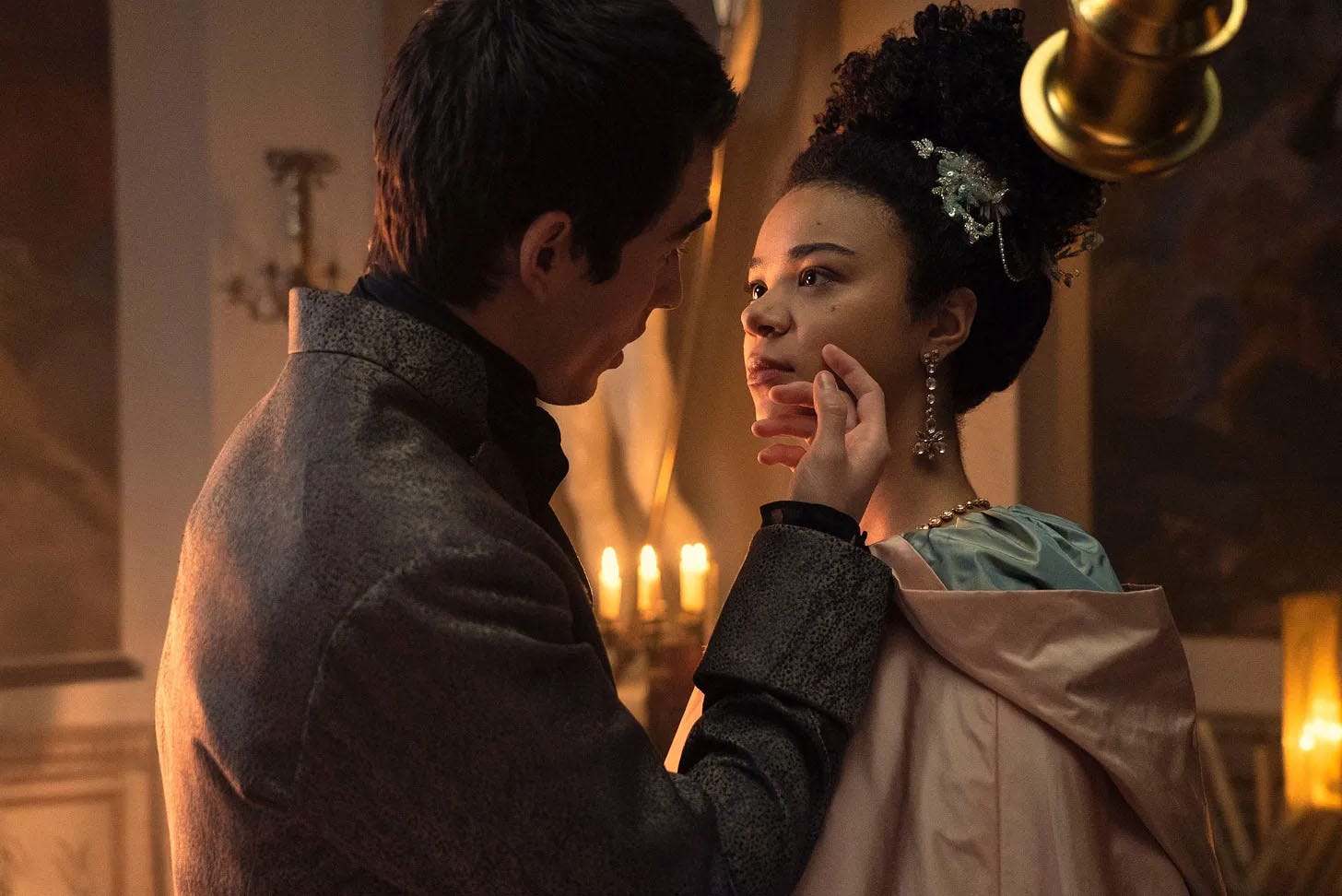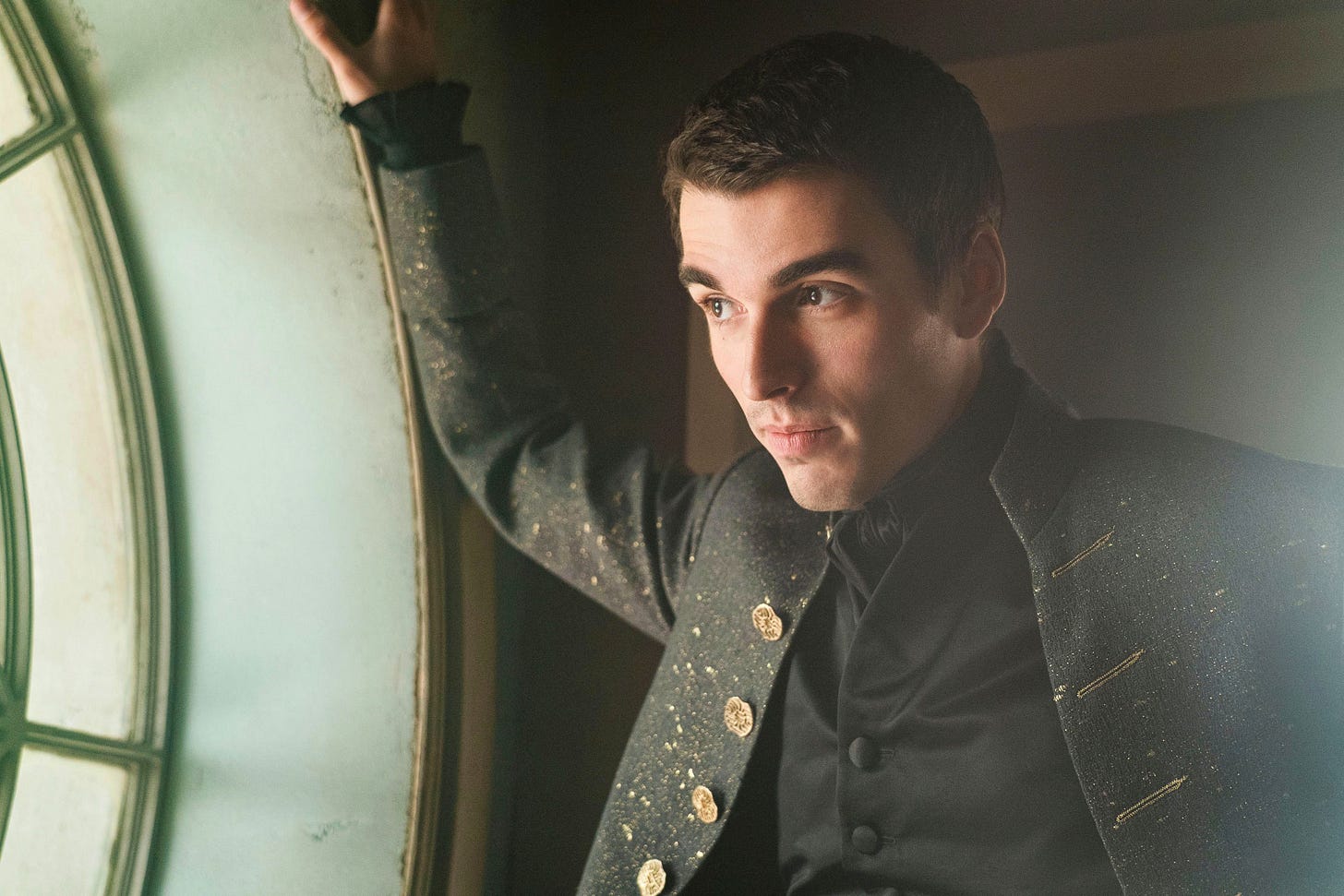Queen Charlotte: A Triumph of Mental Health Conversation
After racial inclusivity, are we ready for neurodiversity?
I was convinced there is no story or a season out of Bridgerton universe that’ll seduce me more than Season 2 and the Viscount/Sharma bonanza, yet it did. ‘Queen Charlotte’ floored me. If you’ve already watched it, proceed; if you still didn’t - this article contains spoilers.
According to Deadline Magazine, the Bridgerton-verse is ruling Netflix. Queen Charlotte has amassed 307M hours viewed and is quickly making its way to becoming one of Netflix’s most popular series of all time. It’s expected to join both seasons of Bridgerton among Netflix’s most-watched series of all time.
Of. All. Time.
Hardly surprising; there is a special kind of imagination in all of Shonda Rimes' work. Magical, even. But magic is not in a fairytale of her tales, but in humanity with which she’s building these three-dimensional characters based on real figures, using historical events to parallel the issues of the society: 250 years ago, and today.
Why does her work speak so much to all of us? Because we think and we say we’re developing this society towards more opportunity, more equality, more inclusivity, but the progress has been minuscule. Because 250 years passed and we’re still having the same conversation over the same issues. Because Shonda Rimes writes absolute poetry in a form of a TV show.
The conversation Princess Augusta has with her court has everything. A reference, a stab, a triumph:
“She is very brown.”
“I did say she had Moor blood, ma’am.”
“You did not say she would be that brown.”
“But I did say she had Moor blood.”
“Very brown.”
“It is a problem. People will talk.”
“People will talk, it is a problem.”
“We have already made the trade deals. Can they be cancelled?”
“We cannot cancel the royal wedding on the day.”
“You might need to. It is a problem.”
“We are the Palace. The problem is only a problem if the Palace says it’s a problem. That is a fact. Is it not?”
“It is.”
In the times of the Meghan Markle fiasco at the hand of the Royal Family, the line is poignant - “We are the Palace. The problem is only a problem if the Palace says it’s a problem. That is a fact”. The year is 2023 and the Palace told you Meghan Markle is a problem. And you ran with it.
Princess Augusta is at the forefront of many triumphs in the form of Shonda Rimes’ words. Using patriarchy as her own weapon:
“What was the doctor’s name?”
“I do not remember names, I am female.”
“Of course. Apologies.”
Bridgerton universe pleases us because it touches on handsome, smart men seeking strong female characters as equal partners. We enjoy it because we finally see racial inclusivity in an unusual setting. We celebrate someone else's turn to finally eat at the table. Call to arms for inclusivity of any kind has never been louder. Except for one. That one is still silent, and Shonda Rimes floored me by introducing it in Queen Charlotte.
Mental diversity. Or more popularly called - neurodiversity.
I refuse to think Shonda didn’t do this purposely and the real life of King George III just happened to align with her storyline’s timeline. That’s why she’s a champion. The humanity in her storytelling is unparalleled.
I’m neurodivergent. My dopamine works differently than in neurotypical people. I’m bothered by a loud, repetitive, or sudden noise, smells, itchy clothes - it all spikes my cortisol levels. Cortisol is a hormone of stress. I don’t have a problem with it myself, I know how to manage my levels, but society has a problem with me. Society is designed in one size fits all principle, and it hates everyone that’s different.
Society doesn’t want to understand, accept, accommodate.
It wants to change.
Watching King George in ‘Queen Charlotte’ and the brilliant Cory Mylchreest that portrayed him, as well as being too familiar with the story of a real King George III shattered me.
All that effort to change someone that’s different that you, instead of just finding ways to accommodate a person that’s different than you.
A word told by history is that the real “Mad King” George III wasn’t mentally ill, but had porphyria that negatively affected his nervous system. 18th-century treatments were cruel and useless, no one in his court had any compassion for his state, and his condition was made worse by his medicines. Doctors didn’t have the insight, science, or means to heal him. They knew little about mental illness and less about the nervous system; he was plied with so much arsenic - a trigger for porphyria, oftentimes physically forcing him to take it, causing him to completely lose his mind by the end of his life.
Before all this, all the way until his 50’s, George III was actually a popular and accomplished monarch. By then, he had ruled for twenty-eight years, presiding over a tumultuous era in British history. Early in his reign, England won the Seven Years’ War and became the world’s greatest colonial power.
But how can the King be different?
Should we nurture him, or poison him to normalcy?
The speech of King George in the series was a vocal point of the message Shonda Rimes gifted us with ‘Queen Charlotte’:
“Now I ask, is that all a king is? A royal stud-horse trotted out for the chosen mare? Or can I king rule in his own way through practical scientific study? Agricultural improvement? Tell me, what would the people prefer? A royal baby or a cheap bread?”
Being “normal” is getting tired. “Normal”, neurotypical people that wake up early and have a certain lifestyle are no better than people who do things differently. There’s some magic, creativity, honesty in the brains of neurodiverse people that constantly get choked out by the world who can’t seem to accept this brand of diversity.
The whole show we’re watching George trying to hide his condition. His mother trying to ignore it. His servants trying to mask it.
Two things in Queen Charlotte made me cry. First is when Charlotte says to her husband’s doctor:
“I care not for his sanity. I care for his happiness. I care for his soul. Let him be mad if mad is what he needs.”
And second, when Brimsley suggests - “we can put the screen in the garden to shield him when he needs to go out (naked)”.
Both scenes show just how much of a difference a one, only ONE understanding, kind, and loving person can do to a struggling brain.
Shonda Rimes took on racial inclusivity in the first two seasons without the stereotypes and puns. But what she did with exploring mental health and neurodiversity in Queen Charlotte shows such nuanced storytelling and exceptional human touch to an ongoing problem that, except for the medical treatments, did not evolve much since the 1800s.
We still fear differences. We’re still medieval about anyone that we don’t understand. Nor do most of us try to.
I once wrote - watching Bridgerton is participating in its imagination. I want to imagine a world, not just the screen, where people with different minds can be accepted, tolerated, accommodated and celebrated. Instead of feared, hated, misunderstood.
If we can watch a white Viscount dancing with his future brown Viscountess, what damage a King who likes to be naked and look at the stars can do to anyone?
On both sides of the screen.



